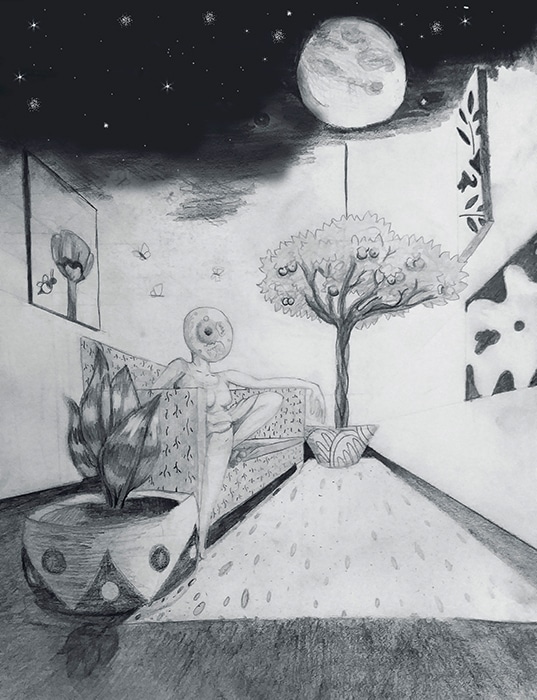ILL 212: Life Drawing II
Tackle advanced topics in life drawing
Life drawing is an endless, fascinating challenge for an artist. In this online advanced life drawing course, you'll learn how to observe and capture the clothed human figure and explore basic techniques for all figure drawings. Working with a trained illustrator, you'll learn essential concepts in form, structure, and motion as you address subjects that interest and engage you. Discover the seven functions of the line, constructing scenes, and incorporating color.
 Student work by Brittani Maviglia.
Student work by Brittani Maviglia. Visit the Student Gallery.
About This Course
Project-Based Learning
Intermediate life drawing studies explore the question of personal style, environmental drawing, and the application of color.
What Skills Will I Develop?
Students in this course can expect to learn to:
- Develop an understanding of the terms of advanced line drawing.
- Understand the significance of an illustrator's authentic line and Andrew Loomis's seven functions of the line.
- Practice line functions and techniques through imitation activities.
- Apply practical fundamentals for personal branding.
- Use constructive lines in life drawings.
- Use formal and informal subdivision grids for illustrated scenery compositions.
- Explore strategies for self-branding online and learn about the importance of protecting your creative rights.
- Make effective grayscale sketches and practice grayscale sketch strategies.
- Develop a personal minimal color palette.
- Research illustrators with unique styles and match specific illustrations to specific line functions.
- Create spot illustration portraits, black and white still lives, and scenes from life of figures that incorporate imagination.
- Stage a creative scene made up of everyday objects in your home and two to three real life figure models, and draw a final full color scene that demonstrates creative vision.
What Software and Supplies Do I Need?
- Computer with Internet connection.
- Access to a digital camera or scanner.
- Drawing materials including pencil, paper, charcoal and easel (full guidelines provided in the course.)
- Adobe Photoshop and Illustrator
- Basic experience in the above software.
Course Outline
This Line is Yours
The course begins with a profound concept. We will explore an illustrator's authentic line, with reference to Andrew Loomis's seven functions of the line. We'll look at examples of line functions in figure illustrations and practice imitating lines. We'll also open up the conversation of personal branding for an artist or illustrator.
Composing Scenery
In Lecture Two, we're going to discuss the importance of scenes, learn two composition and process techniques that help you build interesting scenes, and examine some examples of great scenery. As we go, you'll continue to hone in on your personal style.
Coloring to Life
When we first study drawing formally, it's all about the black and white. A pencil line, a blank piece of paper. But there's a reason for the phrase "in living color." Now we'll look at making your work live vibrantly with color. When used well, color can be seen as a recognizable trait or calling card for an illustrator's body of work.
Frequently Asked Questions (FAQ)
How Do The Courses Work?
Our courses are project-based and instructor-led. In each course you’ll complete a series of lectures, projects, discussions, and critiques designed to stretch your creative skills. Weekly assignment deadlines keep you on track, and with no set-logins or Zoom meetings, you can build your studies around your schedule.
Who Are The Instructors?
Our courses are developed and taught by our industry-leading faculty of creative professionals. This means that you’ll learn in-demand skills, get feedback on your work, and build a portfolio of creative work. View our Student Gallery for featured student projects.
When Can I Start?
Classes start January, April, and August, and this course can be completed as part of a 15-week term in 8 weeks. College credit from this course can be applied to a range of degree and certificate programs at Sessions College.
How Do I Register?
To register for a program, complete our program application. To register for this course on an individual basis, please contact our admissions team at admissions@sessions.edu. An Admissions Advisor will contact you to setup your enrollment.
| Course Tuition and Fees | |
|---|---|
| Tuition | $510/credit |
| Registration Fee* | $200 |
| Total Course Price | $965 |
Registration fees are nonrefundable after 5 days from enrollment.
Is Sessions College accredited?
Yes. Since 2001, Sessions College has been accredited by the Distance Education Accrediting Commission (DEAC). The Distance Education Accrediting Commission is listed by the U.S. Department of Education as a recognized accrediting agency and is recognized by the Council for Higher Education Accreditation (CHEA).
